10 Biggest Moments in Tech 2011
The year 2011 has seen a whirlwind of change in technology. With the death of Apple’s co-founder and CEO, Steve Jobs; Amazon’s entry into the tablet market with the Kindle Fire and more company mergers and acquisitions than you can shake a stick at, the year has proved to be a bit of a roller coaster.
As 2012 approaches, we eagerly await what’s to come in the tech world, but before we say good-bye to 2011, let’s look back at some of the unforgettable events in technology this year.
10. Microsoft Acquires Skype
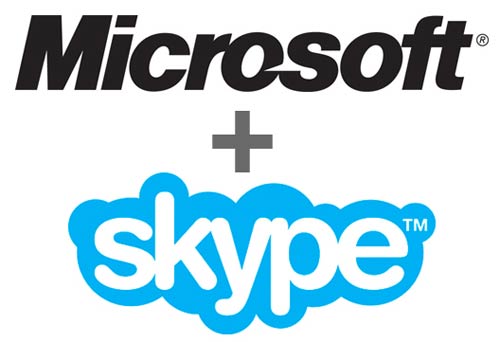
Has the technology orphan, Skype, finally found its way home? Founded in 2003 by Scandinavians Janus Friis and Niklas Zennström, who were also behind the peer-to-peer file-sharing company Kazaa, Skype made a big splash as the go-to video conferencing software for users.
In 2005, the company had built up a sizable user base and was acquired by eBay. Unfortunately, the tumultuous marriage with eBay was shortlived, and after some management and strategic shifts, 70 percent of the company was sold by eBay to a consortium of private investors in November 2009. In May of this year, the company was sold to Microsoft for a whopping $8.5 billion.
BizTech’s James E. Gaskin had this to say about the deal in his article, "What's to Come from the Microsoft-Skype deal?":
“If Microsoft wants to make corporate desktop video conferencing as common as their wavy colored-flag logo, Skype gives them a huge leg up. Why grow a video conferencing user base that reaches every corner of the world when Skype already has one?”
Memorable Tweets:
MSN: Microsoft Skype Network
— Marcel (@bqeg) May 10, 2011
For me microsoft / skype deal would be good - merge expand Lynq to skype users would be awesome + fits with #Office365 story v. Well
— Andrew Woodward (@AndrewWoody) May 10, 2011
9. Microsoft Unveils Windows 8
Microsoft’s Windows 7 operating system has been well received by users and companies alike. But Microsoft is already at work reinventing its groundbreaking OS with Windows 8.
The company is betting on mobile as the future with Windows 8, unveiling its Metro user interface for Windows 8 at the BUILD conference in September. The Metro UI is Microsoft’s tablet OS, but the company hasn’t forgotten about its desktop users, as Windows 8 comes with the traditional desktop interface as well. Users can flip back and forth between the traditional and Metro user interfaces as they wish.
The Metro UI and Windows 8 had the tech community buzzing about the game-changing potential for Microsoft’s next 2-in-1 operating system. The company hasn’t yet set an official release date, but you can follow the progress on the OS at the Building Windows 8 blog.
Memorable Tweets:
I have to say, Windows 8 on a tablet looks incredible. So futuristic.
— Joshua Topolsky (@joshuatopolsky) September 13, 2011
Windows 8: I wonder what the touch gesture for “Ctr + Alt + Del” will be?
— Vitor Lourenço (@vl) June 3, 2011
Windows 8 may be the first version of Windows that would compel a hardcore Mac user to either switch hit or switch outright.
— Chris Pirillo (@ChrisPirillo) September 14, 2011
8. Say Good-Bye to the HP TouchPad — and the End of WebOS?
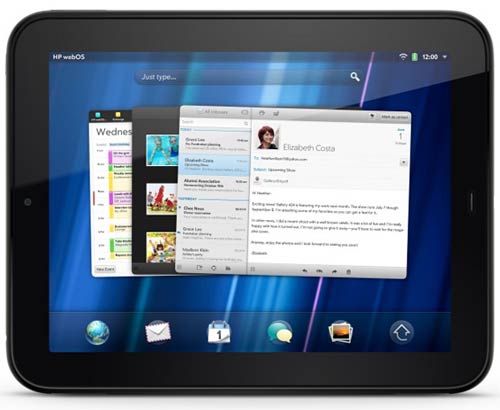
While Android and iOS tablets have been winning over users, HP’s WebOS-based tablet, the HP Touchpad showed promise. Owning the tablet’s operating system WebOS, which was a leftover from the company’s purchase of Palm, made it possible for HP to carve out a unique user experience because, like Apple, it controlled both the hardware and the software.
But in August, the company announced it would be discontinuing the TouchPad, discontinued further development on WebOS and dropped the price to $99 after disappointingly low sales. What HP didn’t realize was that the $99 price point would cause a stampede of demand.
Suddenly, at $99, the HP TouchPad was the tablet to own. Customers scrambled to get their hands on the device wherever they could, with people waiting in line outside stores and hammering the websites of retailers in the hope of scoring a device.
What the TouchPad episode taught us is that there’s a demand for tablets at lower price points. Many buyers are still familiarizing themselves with the idea of a tablet as a computer and are thus hesitant to spend highly on them initially, but they have proved to be eager to buy in to the tablet experience at a more affordable price.
Memorable Tweets:
The TouchPad is like Cher...having its most lucrative success in its series of farewell tours.
— Andy Ihnatko (@Ihnatko) August 30, 2011
New Q&A on PC’s, webOS, and TouchPad: bit.ly/qJ5E0K ...thanks for your comments, more updates soon! #hp
— HP (@HP) August 23, 2011
7. Say Hello to iPad 2
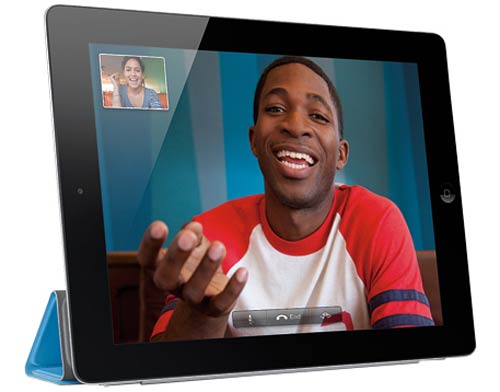
The second generation of the iPad had a lot to live up to. The original product unexpectedly invented a new computing form factor, and made people realize they could navigate their computers and the Internet in a completely new way. So to top themselves, Apple decided to make the iPad 2 more compact and powerful.
That meant shaving off the inches and reducing the weight on the device, which was slimmed down to 0.35 inches in thickness and 1.3 pounds overall. A front-facing camera also was added, which allows users to take advantage of video conferencing. On the tech specs side, Apple threw in a 1-gigahertz A5 processor as well for increased performance.
Interestingly, what got the most buzz was the snap-on case that Apple unveiled alongside the upgrade. In the past, the company has left the case to the third-party market, but for the iPad 2, the case was a centerpiece of Steve Jobs’ unveiling of the device at the beginning of the year. The case comes in several hues, and many Apple enthusiasts scooped up a variety of cases to reflect their varying moods and styles. Sadly, the iPad 2 demo would be the last product launch that Jobs would participate in before his death.
Memorable Tweets:
that magnetic ipad 2 clip case cover stand thing is freaking epic, sold! - bit.ly/ecrBr1
— Kevin Rose (@kevinrose) March 3, 2011
Steve Jobs announces iPad 2 is official, new chip, all new design, up to 9X faster graphics, same battery, dual core tablet.
— Clayton Morris (@ClaytonMorris) March 2, 2011
6. Google Launches Google+
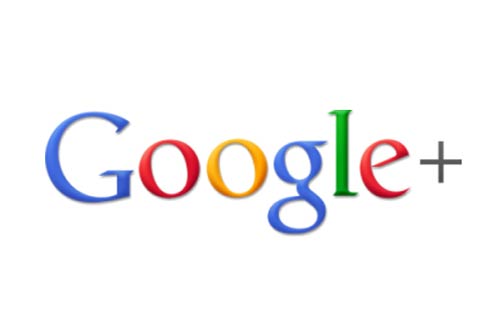
Social networking is a tough market. 2011 saw the end of MySpace, as News Corp. sold the site off to pop star Justin Timberlake and other investors while Facebook, LinkedIn and Twitter, the leading social networks, gained dominance. But also this year, Google jumped into the competition with its own social network: Google+.
The company had already tried its hand at social networking with Google Buzz; however, the response to that product was tepid at best, and the company decided to pull back on the effort. But Google+ was different.
It included an intriguing new feature called circles, which allowed users to sort their acquaintances into self-defined categories. This in turn let users be more selective in the content that they shared and with whom they shared it. The company also launched Google+ profiles for businesses, giving companies yet another platform for reaching out to and engaging with both existing and potential customers.
It’s unclear what the future holds for social networking, but with a user base of over 67 million, Google has a good foundation in the game.
Memorable Tweets:
Google Plus: I don't think I've ever had so much fun dragging rectangles into circles.
— Nelson Gauthier (@nelgau) July 1, 2011
I am the only person on the web who has Google Plus invites.I have THOUSANDS of them, but I'm NOT SHARING THEM WITH ANYONE! wa ha ha ha!!
— Marshall Kirkpatrick (@marshallk) June 29, 2011
5. Amazon Suffers a Cloud Outage

Photo: r_stephen
The cloud has dominated tech talk for the past year with vendors, analysts and tech enthusiasts encouraging companies to move their infrastructures to the cloud for increased efficiency and improved scalability. But on April 21, 2011, companies using Amazon’s EC2 public cloud services were knocked down for the count. The outage, which lasted several days, took down big sites like reddit.com, Netflix and HootSuite.
But there was a silver lining to this dark cloud. Businesses learned that the cloud is no different than a physical data center in that backup and disaster recovery plans must be in place to ensure maximum uptime. The cloud is capable of impressive computing feats, able to accommodate variable network loads and support device independence, but the tenets of good infrastructure matter in the cloud too.
Memorable Tweets:
Amazon's Cloud Outage: Did availability zones work as designed? Roundup of notable analysis & commentary. #aws https://bit.ly/g7KZv1
— datacenter (@datacenter) April 22, 2011
Pretty candid post by Netflix on what worked & what didn't for them during Amazon cloud outage. https://ow.ly/4Kafp
— Michael Pilla (@michaelpilla) April 30, 2011
4. Apple Introduces Siri (and the iPhone 4S)
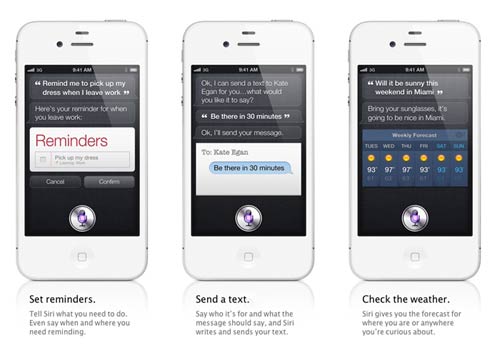
This year, Apple set the tech world abuzz with an old trick: Voice-recognition technology. Steve Jobs used a computerized voice in his debut of the Mac computers in the 1980s and ’90s, but with the company’s 2008 acquisition of Siri (both the application and the company), Apple made a move to take the virtual assistant a step further.
Siri is more than just voice-recognition software; it’s artificial intelligence. The mobile virtual assistant can learn names, set reminders and, most important, understand natural language. Most voice-recognition software requires users to use specific commands (“Open e-mail,” “start new e-mail,” or “send e-mail,” for example), but because Siri uses natural language, there are many ways to get the same task done. For example, you can ask either, “What’s the weather like outside?” or “Do I need an umbrella today?” if you want to know what the temperature is.
Siri is currently limited to the iPhone 4S, the latest version of Apple’s smartphone, but rumor has it that she will also be included in the iPad 3. While Siri has impressed many, Apple is still claiming that the technology is only in its infancy. If true, then the best is yet to come.
Memorable Tweets:
"Siri, I'm bleeding really bad, can you call me an ambulance?" imgur.com/2cY3m.jpg
— Mikko Hypponen (@mikko) December 27, 2011
By 2017, Siri will be the 4th most popular children's name.
— made-up stats (@madeupstats) October 19, 2011
Siri just paused my music to announce there was an accident up ahead. We're living in The Future, Marty.
— Dan Saffer (@odannyboy) November 3, 2011
3. Amazon Debuts the Kindle Fire
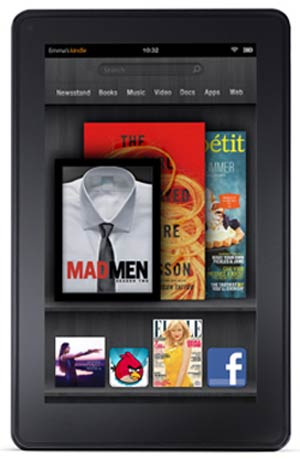
Much of the tablet computing market has been relegated to the shadow of the market leader, Apple’s iPad. But Amazon flexed its corporate muscles and cast a worthy contender in the race with its Amazon Kindle Fire, a color tablet version of its popular e-reader that runs on an Amazon-customized version of the Android OS.
The $200 price point made the tablet a hit with consumers and helped the online retail giant carve out its own space in the field. The 7-inch form factor also helped differentiate the Kindle Fire from the 10-inch iPad. Amazon’s impressive debut proves that there’s room for more than just the iPad in the tablet game.
Memorable Tweets:
So far I'm pretty impressed with the kindle fire. Good interface, smooth, and books and pdfs look nice.
— Andrew Thaler (@SFriedScientist) December 9, 2011
Sorry print books. I love you guys but I have Kindle Fire now.
— Mike Crimmins (@ShotOfCoffee) December 25, 2011
2. Google Acquires Motorola Mobility
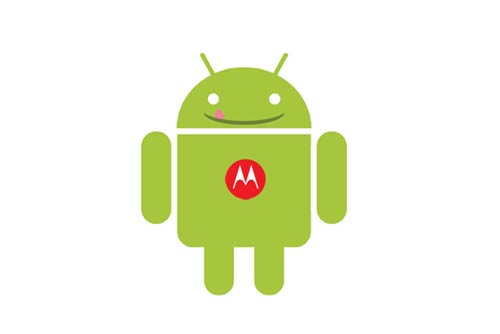
As a giant in search and online advertising, Google has emerged as a leading force in all things technological. But mobile is a completely new battleground for the Mountain View, Calif., company. So far, Google has been successful in establishing its mobile operating system, Android, as a dominant ecosystem among smartphones.
But the path that Google took was completely different from that of Apple. Apple controls both the hardware (iPhone) and the software (iOS), which grants the company complete control over the user experience, as was Jobs’ preference. Google takes a more open approach with Android, allowing different smartphone manufacturers to license the OS and create “skins” on top it.
So when Google announced that it would be acquiring Motorola Mobility for $12.5 billion, many wondered if the company wouldn’t soon be making a play for a fully integrated approach similar to Apple’s.
BizTech’s James Gaskin sums it up best in his article, "So Google Gobbled Up Motorola — What's Next?" :
“In two years, Google could be the iPhone’s biggest competitor. Yep, Google could take on Apple directly — they’ll have their own OS and their own hardware, piles of patents and plenty of cash (even after the $12.5 billion Motorola Mobility purchase). If you ever wondered if Android could leapfrog Apple’s iPhone design and “it” factor, just wait."
Memorable Tweets:
Sharing: How the Google Motorola Deal Went Down https://gri.ms/KXwe
— Andy Beal (@AndyBeal) September 14, 2011
finally a fresh angle to google-motorola: will motorola's 19k employees get the free food?
— Brian Morrissey (@bmorrissey) August 15, 2011
Now all 3 major 'mobile ecosystems' have hardware + software + supply chain: Apple, Microsoft / Nokia, Google / Moto #google #motorola
— James Parton (@jamesparton) August 15, 2011
1. Steve Jobs Dies
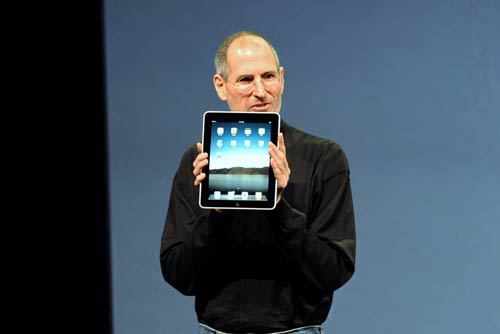
Photo: Matt Buchanan
For the past decade, technology found a guru in Steve Jobs, Apple’s co-founder and CEO. As a technologist, he helped to reshape the way we thought about computing with multiple game-changing products, starting with the iPod, which revolutionized the music industry, and the iPhone, which has served as a standard of excellence in the smartphone market. The iPhone was then followed by the iPad, which launched many an essay on the impending post-PC era. But Jobs didn’t forget desktop and notebook users. The Macbook Air has proved to be a resounding success, helping lay the foundation for a bevy of ultrathin notebook options in 2012.
The tech community and the public at large felt a connection with Jobs’ vision, and when he died on Oct. 5, the tragic loss was mourned worldwide. Countless tributes and messages of condolence immediately swamped the web, and impromptu memorials appeared outside Apple stores across the globe. As Steve was remembered, many agreed that though his passing would hurt temporarily, the legacy he left as a visionary at Apple would last forever.
Memorable Tweets:
Rest in peace, Steve Jobs. From all of us at #Obama2012, thank you for the work you make possible every day—including ours.
— Barack Obama (@BarackObama) October 6, 2011
For those of us lucky enough to get to work with Steve, it’s been an insanely great honor. I will miss Steve immensely. b-gat.es/qHXDsU
— Bill Gates (@BillGates) October 6, 2011
I never thought I could be so busted up about the loss of someone I never met. #stevejobs
— ashton kutcher (@aplusk) October 6, 2011







